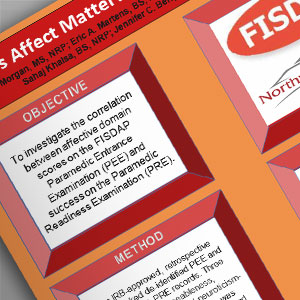ABSTRACTS
Does Affect Matter? A Correlation Study Between Affect & Exam ScoresAuthor: Whitney Morgan MS, NRP | | Northwest College Associate Authors: Martens, Eric A., BS, EMPA, NRP | Dworak, Mason, BA, EMT-B | Brantz-Miller, Alycia M., MS, NRP | Rollman, Jeffrey E., MPH, NRP | Khalsa, Sahaj, BS, NRP | Berry, Jennifer, BA | Fentress, Thomas, MBA, NRP, PI, CFI | Dinsch, James, MS, NRP, CCEMTP
Introduction Accreditation standards pressure paramedic programs to admit students most likely to succeed. Therefore, it is critical for programs to understand how to best predict student success. The Fisdap Paramedic Entrance Exam (PEE) assesses several affective domains based on the M5-50 personality trait index, a specific subject-based ordering of International Personality Item Pool (Goldberg, 1999), which is considered fairly reliable for personality analysis (Socha, 2010). The Paramedic Readiness Exam (PRE) evaluates summative knowledge. Objective To investigate the correlation between affective domain scores on PEE and success on PRE. Method An IRB-approved, retrospective study linked de-identified PEE and first-attempt PRE records from Fisdap (an online EMS database). Three domains--agreeableness, conscientiousness, and neuroticism--were provided. R Studio was used for statistical analysis and graphical interpretation. Results A total of 1,097 students met the requirements for inclusion. Scatter plots were used to identify possible relationships. The Pearson correlation coefficients provided are means and a score of greater than ±0.2 demonstrates a significant correlation between the two variables. For the PRE with cut score 73, agreeableness (-0.089, n=2); conscientiousness (-0.032, n=4); and neuroticism (0.030, n=5). For PRE with cut score of 65, agreeableness (0.078, n=2); conscientiousness (0.038, n=2); and neuroticism (0.029, n=2). Subject-specific scores on the PRE were correlated with affective domains. Agreeableness: airway (-0.035, n=2); medical (-0.021, n=1); cardiology (-0.090, n=1); operations (-0.098, n=2); trauma (-0.11, n=1). Conscientiousness: medical (0.034, n=2); obpeds (-0.025, n=2); airway (-0.036, n=2); cardiology (-0.050, n=1); operations (0.037, n=1); trauma (-0.013, n=1). Neuroticism: cardiology (0.088,n=1); obpeds (0.082, n=1); operations (-0.037, n=1); and trauma (-0.092, n=1). Discussion PRE scores with either the published cut score of 73 or cut score of 65, as well as all subject scores, showed a very weak relationship with any affective domain. Conclusion PEE affective domains provide very weak indication of the student’s ability to achieve high scores on PRE in either the overall score or subject-specific scores.
|

